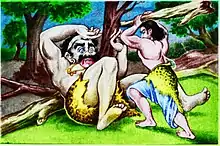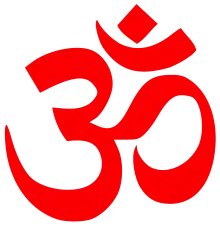Bakasura
Bakāsura (Sanskrit: बकासुर, IAST: Bakasura) is a rakshasa, a supernatural "man-eater" in the Indian Sanskrit epic Mahabharata. He is also known by the names Baka or Vaka. He was killed by Bhima. The demon lived near the city of Ekacakrā (sometimes called Cakranagarī) and forced the king to send him a large number of provisions every week, which he devoured along with the men who provided them. Bhima was eventually sent out to kill Bakāsura under the direction of his mother Kunti.[1]
| Bakasura | |
|---|---|
| Mahabharata character | |
 Bakasura was beaten by Bhima | |
| In-universe information | |
| Species | Demon |
| Gender | Male |
| Affiliation | Rakshasa |
Possible Locations of the Destruction of Bakasura
There are multiple traditional locations for Bhima's slaying of Bakasura.
Listed here are several of them:
- The city of Ekacakra is believed by some to be the modern-day location of a small village near the town of Rampurhat in West Bengal. The Paṇḍavas stayed there during their exile. Alternatively, according to some historians and regional folklore, the town of Pandaveswar near Durgapur in the district of Burdwan, is the site where that village existed, with a well-known temple having several ancient Lingams, representations of Shiva, near the banks of the Ajay River. It is said to have been established by the Pāṇḍavās and their mother Kuntī.
- This temple is partly controlled by the Mahants of the Nimbarka Sampradaya. In the locality of Ukhra, near Pandaveswar, there is a mutt (a monastery of that sect) that was established by the erstwhile Zamindar of Ukhra. The site of the slaying of Bakasura is said to be in a place called Bhimgarh situated on the other side of the Ajay River.[2][3]
- Other sources locate the city of Ekacakra (Ekcakranagari) in the present-day village of Erandol in the Jalgaon district of Maharashtra. On the outskirts of Erandol, near a pond of water, tourists visiting today can still see some of the fallen rice markings of that era. The Padmalaya Ganesh temple, in the neighboring hills, is also an important tourist and pilgrim destination. In the city of Erandol, there was an ancient place known as "Pandav Wada" (heirlo) which is said to be a place where the Panadavas lived with their mother. It is believed that in Padmalaya, 12 km away from Erandol, Bhima attacked and destroyed Bakasura. Bhima had traveled that 12 km, burdened with food, on an underground road that extended under Erandol. This underground roadway was later blocked entirely.
- Pratapgarh district in Uttar Pradesh is another ancient religious site. According to Bhayaharan Nath Dham's legends, Bakasura was killed in South Pratapgarh which was once called "Dwaitwan". Remains have been found of several Paṇḍava sculptures. After Bhima killed the demon Bakasura, a Lingam was established here. Today, it is known as the location of the Shaivite Bhayaharan Nath Dham Temple, and serves as a reminder of the story of the Paṇḍavas and Bakasura.
References
- Gopal, Madan (1990). K.S. Gautam (ed.). India through the ages. Publication Division, Ministry of Information and Broadcasting, Government of India. p. 75.
- "Khoni Shohore Pran Peyeche (Bengali)". anandabazar.com. Retrieved 10 October 2017.
- "বীরভূমের ইতিহাসে পৌরাণিক এবং তান্ত্রিক প্রসঙ্গ". bongodorshon.com. 17 May 2017. Retrieved 10 October 2017.
- "Bakasura, Bakāsura, Vaka, Baka | They were here and might return". Scoop.it. Retrieved 20 July 2020.
- Dowson's Classical Dictionary of Hindu Mythology
- Acharya Chandra Shekhar Shastri: Puranon ki Anmol Kahanian, 2006 ISBN 81-902258-6-3
This article is issued from Wikipedia. The text is licensed under Creative Commons - Attribution - Sharealike. Additional terms may apply for the media files.
